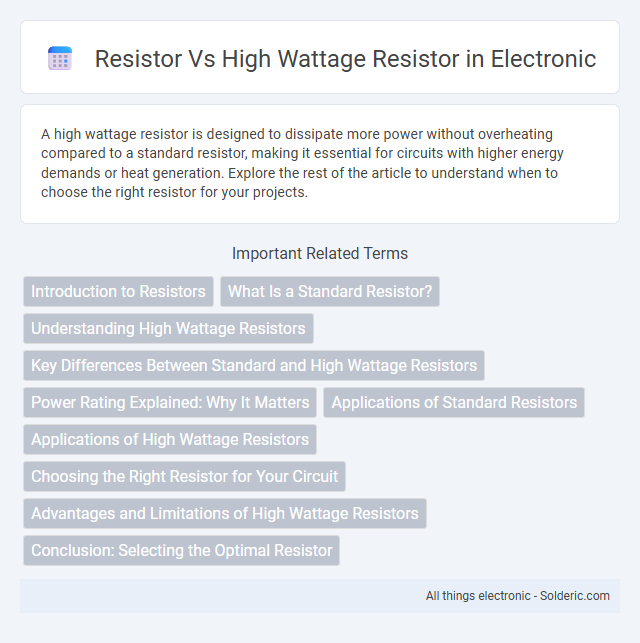A high wattage resistor is designed to dissipate more power without overheating compared to a standard resistor, making it essential for circuits with higher energy demands or heat generation. Explore the rest of the article to understand when to choose the right resistor for your projects.
Comparison Table
| Feature | Resistor | High Wattage Resistor |
|---|---|---|
| Power Rating | Typically 0.125W to 0.5W | 1W to 50W or higher |
| Application | Signal conditioning, low power circuits | Power dissipation, load testing, industrial use |
| Size | Small, compact | Larger, bulkier for heat dissipation |
| Heat Dissipation | Limited, needs external cooling if overloaded | Designed for efficient heat dissipation |
| Material | Carbon film, metal film | Wirewound, metal oxide |
| Cost | Lower cost | Higher cost due to design and materials |
| Durability | Standard durability | Enhanced durability under high power and temperature |
Introduction to Resistors
Resistors regulate electrical current by providing precise resistance values in circuits, essential for controlling voltage and current flow. High wattage resistors are designed to dissipate greater power levels, typically ranging from 5 watts to over 100 watts, making them suitable for high-power applications and heat-intensive environments. Their increased physical size and robust construction ensure reliable performance under higher thermal stress compared to standard resistors.
What Is a Standard Resistor?
A standard resistor is a passive electrical component designed to limit current flow and drop voltage within a circuit, typically rated for power dissipation around 0.25 to 0.5 watts. These resistors are commonly used in low-power applications where heat generation is minimal and does not require specialized cooling or packaging. High wattage resistors, by contrast, handle power ratings from 1 watt up to several hundred watts, featuring enhanced materials and larger sizes to safely dissipate significant thermal energy.
Understanding High Wattage Resistors
High wattage resistors are designed to dissipate significantly more power compared to standard resistors, often exceeding 5 watts, enabling them to handle higher electrical loads without overheating. These resistors typically feature robust materials such as wire-wound or metal oxide coatings, optimizing heat tolerance and durability in demanding applications. Understanding the thermal management and power ratings of high wattage resistors is essential for electronic circuit design where reliability and performance under stress are critical.
Key Differences Between Standard and High Wattage Resistors
Standard resistors typically handle power ratings up to 0.5 watts and are used in low-power applications, whereas high wattage resistors can dissipate several watts, often exceeding 5 watts, making them suitable for high-power circuits. The key differences include thermal management, as high wattage resistors are designed with materials and structures that improve heat dissipation, preventing damage under heavy loads. Electrical characteristics such as tolerance, stability, and noise performance also vary, with high wattage resistors offering enhanced durability in demanding environments.
Power Rating Explained: Why It Matters
High wattage resistors have a greater power rating, allowing them to dissipate more heat without damage compared to standard resistors. Your circuit's reliability depends on selecting a resistor with an appropriate wattage to prevent overheating and component failure. Understanding power rating ensures efficient performance and longevity in electrical applications.
Applications of Standard Resistors
Standard resistors are widely used in electronic circuits for tasks such as current limiting, voltage division, and signal conditioning, making them essential in consumer electronics, LED lighting, and telecommunications. Their power ratings typically range from 1/8 watt to 1 watt, suitable for low-power applications where heat dissipation is minimal. You should select standard resistors for compact designs with light power loads to ensure efficiency and reliability.
Applications of High Wattage Resistors
High wattage resistors are designed to handle significantly higher power dissipation compared to standard resistors, making them ideal for applications that involve high current or voltage loads. These resistors are commonly used in power supply circuits, motor control, and load testing where reliable heat management is crucial for operation and safety. When selecting components for your project, high wattage resistors ensure durability and stability under demanding electrical conditions.
Choosing the Right Resistor for Your Circuit
Choosing the right resistor for your circuit involves considering both the resistance value and power rating to ensure efficient performance. High wattage resistors are designed to dissipate greater amounts of heat, making them ideal for circuits with higher current or voltage demands. Selecting a resistor with an appropriate wattage rating prevents overheating, prolongs component lifespan, and maintains circuit stability.
Advantages and Limitations of High Wattage Resistors
High wattage resistors offer superior power dissipation, enabling them to handle larger electrical loads without overheating, which enhances reliability in high-power circuits. Their advantages include increased durability and stability under thermal stress, making them ideal for industrial applications and power supplies. Limitations involve larger physical size and higher cost compared to standard resistors, along with potentially slower response times in high-frequency circuits.
Conclusion: Selecting the Optimal Resistor
Choosing the optimal resistor depends on the power dissipation requirements and the application environment. High wattage resistors are essential for circuits with significant current flow or heat generation, ensuring durability and stability under heavy loads. Standard resistors suffice for low-power applications where minimal heat is produced, optimizing cost and size efficiency.
resistor vs high wattage resistor Infographic

 solderic.com
solderic.com